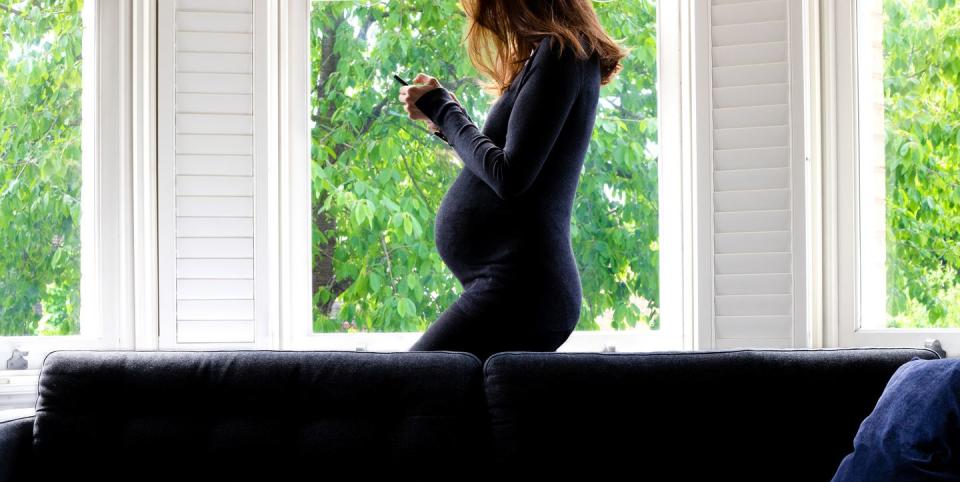An expert's guide to tackling pregnancy acne

A 'radiant glow' has long been associated with pregnancy, but for many women it's an entirely different story. From morning sickness to a lack of sleep and, of course, ever-fluctuating hormones, pregnancy can spell trouble for a previously clear complexion.
Pregnancy acne may not be discussed much, but it's a prevalent issue. To make matters trickier, many of the more potent ingredients usually used to target breakouts are unsuitable for use during pregnancy, making it more difficult to keep your skin clear.
Here, we speak to the experts to reveal exactly how to handle pregnancy acne safely and effectively.
What causes acne during pregnancy?
"Pregnancy acne can be common in the first trimester due to surges in progesterone that drive increased oil gland activity," explains consultant dermatologist Dr Anjali Mahto. "This increase in oil secretion can lead to pores becoming blocked and blemishes forming."
Pregnancy can also be a stressful time, meaning there might be an increase in cortisol which is also believed to have a knock-on effect on sebum production.
"Pregnancy acne can be characterised by cystic, under-the-skin blemishes that are usually painful to touch and often situated along the jawline, chin and neck," reveals Daniel Isaacs, Director of Research for Medik8.
How can I get rid of acne during pregnancy?
If you are pregnant, retinol (which is commonly recommended for acne) isn’t advised. Why? When vitamin A is taken orally (i.e. Roaccutane/Accutane), it can cause congenital disabilities in unborn babies. "Whilst there are very few clinical trials carried out in pregnancy, retinol is deemed unsafe as it is a vitamin A based compound," says Dr Mahto. "Excess vitamin A in topical form could theoretically be absorbed through the skin and lead to potential birth defects."
However, there are alternatives that are safe to be used during pregnancy. "Hormonal acne can be controlled with consistent therapy and treatments," says Isaccs. Ingredients to look out for include; Bakuchiol, vitamin C, niacinamide, peptides and hyaluronic acid.
"These all are generally considered safe for topical use during pregnancy, and there is no research to suggest otherwise. Together these ingredients can address all common pregnancy skin issues including blemishes, pigmentation and dehydration while keeping up the anti-ageing power."
How to treat pregnancy acne: a facialist's guide
Jennifer Rock, dermal facialist and founder of Skingredients takes us through her pregnancy-approved skin routine:
Step one: double cleanse
"Take it back to basics," says Rock. "Ensure you’re double-cleansing thoroughly AM and PM. Use a pre-cleanse tool like Skingredients Microfibre Cleanse Off Mitt or a pre-cleanse balm or oil, and follow it up with a mild, nourishing cleanser."
"Cleanse for at least 60 seconds, massaging your chosen cleanser into your skin, and get into all of the nooks and crannies – the hair line, the corners of the nose, the jaw line, the neck and chest – from the nipples up. By removing all traces of makeup, oils and SPF, you’re helping those overworked pores out."
Step two: spot treating
"Don't fret when treating spots as there are many pregnancy-safe solutions out there. Acnaut Active Lotion contains niacinamide, vitamin B3, a known spot-fighter, plus methenamine, an antibacterial ingredient, and is considered to be safe for use during pregnancy."
Anti-inflammatory ingredients will help to reduce the redness and swelling you see with some breakouts, so make sure your routine contains soothers like liquorice root, aloe vera and green tea extracts, for example.
Just as drinking water is essential for our general health, external hydration is key for the skin too.
Step three: SPF
Have patience and try your very best not to pop any blemishes. "Squeezing acne can cause the pustule to rupture, meaning spreading of bacteria beneath the skin and even long-term damage to the walls of your pores, as well as increasing your risk of scarring," warns Rock.
"If you are seeing acne during pregnancy and not using an SPF already, I’d highly recommend incorporating one daily to help to prevent PIE a.k.a post-inflammatory erythema (red acne scars) from sticking around."
Like this article? Sign up to our new newsletter to get more articles like this delivered straight to your inbox.
You Might Also Like

 Yahoo Finance
Yahoo Finance 